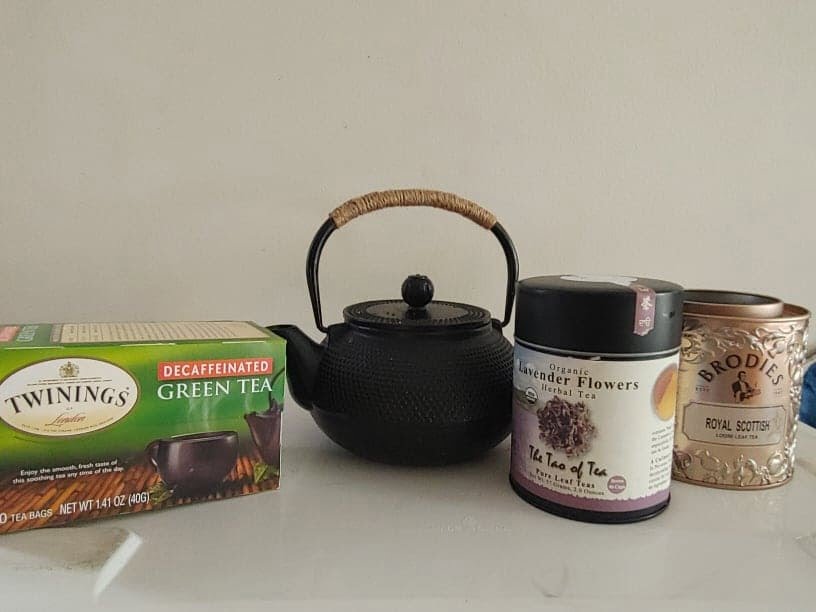English Breakfast
A simple and recognizable black tea, English Breakfast can be found in almost any place that sells tea. It boasts one of the higher caffeine concentrations, clocking in at 42 mg per 8 oz. cup, which is almost half a cup of coffee. While it has no calories, fats, or sodium, it is not lacking in a ton of antioxidants and minerals that can improve focus and heart health.
High concentrations of caffeine complement the theanine in English Breakfast that researchers believe helps improve focus and concentration. It also contains various flavonoids that help protect your heart from coronary heart disease and lower your cholesterol. While it does have a high tannin content that gives it a strong flavor, English Breakfast is a healthier choice for someone looking to replace their daily cup of coffee.
Green Tea
If you’re looking for the tea with the most health benefits, look no further. Green tea is the multivitamin of tea; it does a lot of good in a little package. Many researchers are even convinced that green tea is the healthiest drink a person could have.
A literature review on green tea revealed that green tea:
- Protects against cancers and heart disease
- Improve type-II diabetes symptoms
- Anti-inflammatory aid
- Lowers cholesterol
- Prevent oxidative stress
- Aids immune system in antibacterial and antiviral campaigns
- Improves absorption of iron
along with a whole host of other effects. It also boasts about 35 mg of caffeine in an 8 oz. cup, so it might not give you the same burst of energy as English Breakfast, but can still get you going. Recent studies have shown that the high levels of catechins in green tea benefit many aspects of your health, and if you’re looking for something that does a lot of overall good, green tea is the right tea for you.
Matcha Tea
Matcha tea is created differently than a typical green tea, even though it uses the same plant, Camellia sinensis. The plants are placed in shade for up to three weeks, which increases the levels of chlorophyll and amino acids in the leaves. Shown to possibly have more antioxidants than even green tea, matcha also comes with its own unique, umami-esque flavor profile.
Since matcha is typically powdered and directly added to hot water, as opposed to being seeped like with most other teas, matcha has a higher concentration of caffeine, about 50 mg per 8 oz. cup. While it does have a taste that people either love or hate, matcha has shown to help protect liver health, speed up your metabolism, and improve your heart and blood vessels.
White Tea
While other teas tend to go through some sort of processing, white teas are unique in that they are completely uncured and unfermented. Because of this, researchers have found the highest levels of theanine and antioxidants in any tea. These have many properties to protect your cells from cancer. Some of these antioxidants have shown to possibly increase metabolism, aiding in weight loss, but many studies have been inconclusive on this.
White tea has been shown to aid in clot prevention, reducing the risks of having a stroke or heart attack. And some research is showing that they can help reduce depression and anxiety symptoms. Do your research before going out to buy any type of white tea, though; they’re not commonly sold in most grocery stores. You’ll most likely find these at a specialty shop.
Oolong Tea
The primary choice of tea for southern China, oolong tea comes with its own special properties. One study showed that oolong tea can help protect against dyslipidemia, or abnormally high levels of fat in the bloodstream. Another study showed that the high levels of polyphenols found from the oxidation process oolong goes through helps ease eczema symptoms. It does, on average, contain about 60 mg of caffeine per 8 oz. cup, so you’ll be sure to get energized after drinking some oolong .
Chamomile Tea
While most other teas are made from different varieties of the Camellia sinensis plant, chamomile tea is different. It is part of a category of teas called herbal tea. Made from different blends of herbs and spices, these teas tend to be extremely low in their caffeine concentrations. As such, the gentle tastes, low caffeine, and the naturally mild sedative chemicals within chamomile have allowed it to be a great sleep aid, providing a more soothing effect. Chamomile is also low in tannins. This gives it a more fruity and robust flavor profile that also can aid in gut health and sore throats.
In Short
There’s a whole variety of tea out there, each with their own specific benefits. Whichever one is right for you depends on your own personal situation. Each one has, even past their health benefits, their own unique flavor profiles, textures, and ways to drink them. Hopefully, this guide was able to help you pick one that’s just right for your health journey!

